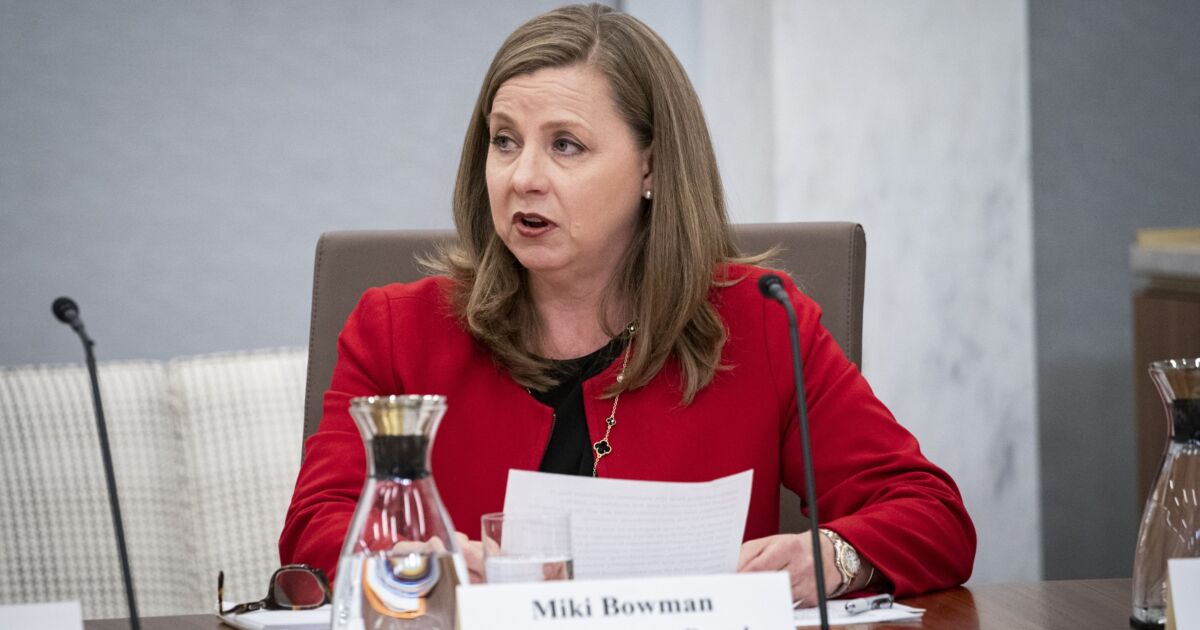
- Key insight: Fed Vice Chair for Supervision Michelle Bowman signaled that she is onboard for notable short term interest rate cuts if the labor market picture continues to worsen.
- Expert quote: "The recent data, including the estimated payroll employment benchmark revisions show that we are at serious risk of already being behind the curve in addressing deteriorating labor market conditions," Bowman said.
- What's at stake: Bowman's dovish take on the need to significantly cut interest rates to prop up the central bank's employment mandate, echoes other speeches given by members of the board appointed by President Donald Trump.
The Federal Reserve's top regulator thinks recent economic indicators may justify steeper short-term interest rate cuts in the near future, warning of "serious risk" to the employment side of the central bank's dual mandate. Fed Vice Chair for Supervision Michelle Bowman, speaking at the Kentucky Bankers Association's Annual Convention Tuesday, said she was relieved that the Federal Open Market Committee voted to cut rates by 25 basis points in September, but said the central bank should have cut rates months earlier.
Bowman pointed to what she described as deteriorating labor market conditions and said that, if current trends continue, the Fed may need to respond with quicker and larger monetary policy adjustments.
"The recent data, including the estimated payroll employment benchmark revisions show that we are at serious risk of already being behind the curve in addressing deteriorating labor market conditions," Bowman said. "Should these conditions continue, I am concerned that we will need to adjust policy at a faster pace and to a larger degree going forward."
She cited a rise in the unemployment rate to 4.3% in August and flat payroll employment growth — averaging just 25,000 new jobs per month since April — as warning signs that the labor market may be "on the cusp of deteriorating."
While the labor market remains near full employment, Bowman said it "has become more fragile," noting that layoffs have begun to rise and "could rise quickly if the economy weakens further since hiring rates have remained low."
During her speech, Bowman dismissed concerns of tariff-induced inflation, noting that she is "more confident" that import taxes will have only a small and short-lived impact on inflation. She also said that lower immigration is likely to put downward pressure on inflation.
"On trade policy, foreign suppliers are absorbing some of the new tariffs, and importers are shifting to lower-tariffed sources," she said. "Slack in the economy should also allow for only limited one-time price effects this year and very little, if any, 'second round' effects on inflation in the medium term.
"I expect that lower immigration will continue to lessen demand and reduce inflation, especially on housing services," Bowman continued. "I also expect that less restrictive regulations, lower business taxes, and a more friendly business environment are likely to boost supply and offset any tariff-related effects on economic activity and prices over the medium term."
Bowman also urged the central bank to shift its approach away from overemphasizing the latest data points and toward a more forward-looking view of how the economy is evolving.
"I think we should consider reframing our focus from overweighing the latest data to a proactive forward-looking approach and a forecast that reflects how the economy is likely to evolve going forward," she said. "This approach would better position us to avoid falling behind the curve and then having to implement abrupt and dramatic policy actions."
Her remarks echoed some points made a day earlier by Fed Governor Stephen Miran, who said in a speech Monday that current monetary policy is "very restrictive" and "poses material risks to the Fed's employment mandate." Miran
Miran was the only member of the Federal Open Market Committee to dissent to the most recent 25 basis point, calling instead for a 50-basis-point cut. The other 11 members — including Trump-appointed governors Christopher Waller and Bowman — supported the quarter-point move.Nine members of the Fed's rate setting committee said in their quarterly economic projections last week that two more 25-basis-point rate cuts



